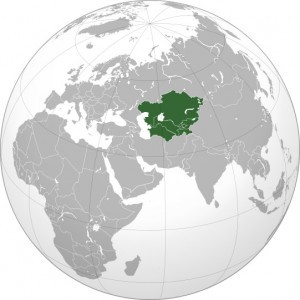BISHKEK (TCA) — The Times of Central Asia presents to its readers Stratfor’s Global Intelligence, a weekly review of the most important events that happened in the world — from Europe to Middle East to Russia to Central Asia to Afghanistan to China and the Americas.
The Week That Was
NATO Summit
Russia is smoldering this weekend as it watches NATO members come together in Warsaw to discuss and finalize long-standing plans to build up their presence in Poland and the Baltic states. But Russia is not standing idle, either. Russia has already been building up its forces in the Western Military District and strengthening its Black Sea fleet. Russia is also extremely active on the diplomatic front these days in trying to sow divisions within the Western alliance. Notably, French President Francois Hollande, who has been particularly soft on Moscow and keen on mediating a diplomatic compromise in contentious areas like Ukraine and Nagorno-Karabakh, went out of his way during the summit to try and reassure Putin that NATO does not see Russia as a threat or an enemy and that Washington will not be the only one to steer NATO’s agenda. Of course, those countries on Europe’s eastern flank would disagree.
More Bargaining on Syria
While playing off European divisions, Russia is also advancing its dialogue with the United States. The Russian rumor mill has been running wild with conspiracy theories on why President Vladimir Putin cancelled all of his meetings this past week, but Putin has apparently been very active behind closed doors. Putin called up President Barack Obama this week, picking up from where Russian Foreign Minister Sergei Lavrov and U.S. Secretary of State John Kerry left off last weekend. The two sides are sounding quite cooperative so far in working out details for coordination in Syria, but the complications are proliferating by the day. A Russian-backed loyalist siege on Aleppo, where radical rebels like Jabhat al-Nusra are heavily concentrated, is a case in point. Even if Russia wanted to deescalate in Aleppo as a concession to move the dialogue further with Washington, it cannot fully control the actions of the Syrian loyalists and their Iranian backers.
Compromise on Italy’s Banks
It looks like we are getting closer to a compromise between the European Union and Rome on what to do about Italy’s troubled banking sector. The European Central Bank is likely to support Italy’s request for authorization to use public money to help Monte dei Paschi di Siena, Italy’s third largest lender in distress. An approaching stress test for Italian banks at the end of the month will justify the exception to the Eurozone’s bail-in rules, but Germany and its allies in the northern bloc will not be happy about it.
Reforming China’s State-Owned Enterprises
The focus of the last week in China has been on state-owned enterprises and streamlining sectors suffering from overcapacity problems, including the steel and coal industries. China is targeting a 10 percent reduction in those sectors’ capacity in the next 2 years and 15 percent in the next 5 years by centrally owned state-owned enterprises, however the biggest challenge in reigning in capacity remains following through at the local level. To do so China is asking its provinces to outline target goals in cuts by July 15 with action plans on how to do so by the end of July and face punishment if they do not comply or follow through. China has also dispatched environmental inspection teams to eight provinces. These provinces include Ningxia and Inner Mongolia (sparsely populated coal-producing regions), Heilongjiang (an old Manchurian industrial province) and southwestern Guangxi.
The government is likely going to use environmental inspection teams — modeled after the anti-corruption inspection teams — to try to enforce cuts. Beyond state-owned enterprise reform, the United Front Work Department, the Communist Party department tasked with building support for the party across the population, set up its eighth bureau. The bureau targets a “new social class,” among it the employees of private sector firms such as Xiaomi and Alibaba—which now far outproduce China’s old state-owned economy. Beijing is not necessarily trying to bring these companies under its control similar to state-owned enterprises, but rather ensure that China’s modern entrepreneurs buy into the status quo of party leadership over the country so they have the incentive to maintain it.
THAAD
Seoul and Washington finally agreed to deploy the controversial Terminal High Altitude Area Defense (THAAD) ballistic-missile interception system in South Korea and are in the final stages of proposing a site for the deployment. The two allies reportedly opened negotiations shortly after North Korea fired a long-range missile in early February, a month after conducting its fourth nuclear test. We saw the expected protests from China that THAAD would destabilizing and counterproductive to Korean denuclearization efforts.
Previous efforts by China to entice South Korea out of the U.S. camp have not gone over well with the South Korean population, especially when Beijing threatens to economically punish Seoul. What is more concerning to China is that THAAD’s actual deployment is how South Korea’s threat perceptions are evolving in reaction to the progress North Korea is making in its weapons program. This is driving South Korea and Japan closer together, which helps the United States construct a more coherent security alliance in the region.
Talks in Venezuela
We are seeing some hints that a long-stalled dialogue between the Venezuelan government and the opposition could start to budge. To be clear, Venezuelan President Nicolas Maduro would love to drag the dialogue out for as long as he can to avoid being forced into resignation. But funds are getting tight and the country is facing a real threat of defaulting on debt payments due in October and November. A financial shock to Venezuela’s already decrepit economy would make it very difficult for Venezuela to pay for imports of basic items that are already in severe shortage, thus raising the potential of serious unrest on the streets. If that scenario is growing more realistic, more of the moderates within the government may be pushing to engage more seriously in a negotiation for a political transition. Notably, Gen. Nestor Reverol, a national guard commander who also belongs to a narco-trafficking clique that includes Aragua State Gov. Tareck el Aissami, was removed from his position this week. Given that both want to avoid extradition to the United States, narco-politicians like Reverol and el Aissami have been most resistant to the calls for a recall referendum. If they are losing influence, then we may see some obstacles to the recall referendum removed.
Full Articles
How Russia Will Use Brexit to Fight Sanctions
Europe is not the only region affected by Britain’s vote to leave the European Union. The decision will also have significant effects on Russia, especially where sanctions are concerned. As the Continent focuses on mitigating and managing the fallout from the Brexit vote, it probably will have fewer resources to devote to problems beyond the European Union, namely those in Ukraine, Syria and Nagorno-Karabakh — all areas where Russia plays a major role. The European Union is also likely, at least in the immediate term, to have less interest in advancing its political and economic integration projects in the former Soviet periphery, such as the Eastern Partnership program.
A Test of China’s True Intentions in Space
Beijing is in the process of modernizing and enhancing its space launch capabilities. During the week of June 27, China carried out the inaugural launch of its Long March 7 system, part of a new generation of rocket systems that include the Long March 5 and Long March 6. The Long March 7, using the most powerful rocket ever built in China, will be the workhorse of the nation’s future space missions, eventually carrying taikonauts and supplies into orbit for its planned space station. Though the launch was a notable achievement, the secondary payload it carried — the Aolong-1 or “Roaming Dragon,” a small satellite designed to collect space debris with a robotic arm — has stirred up familiar speculation about the true nature of China’s space program.
More Boats on the Black Sea
Since Russia’s 2014 annexation of Crimea, the balance of naval power in the Black Sea has shifted. Ukraine has been all but pushed out of the arena as Moscow, exploiting its position on the Crimean Peninsula, has built up its fleet strength in the sea. Meanwhile, the strategic importance of the waters has risen in NATO’s eyes as the bloc seeks to bolster its deterrence against Russia in Europe.
To counter Russia’s presence, Turkey and Romania will advocate strengthening the joint NATO naval force in the Black Sea at the security alliance’s Warsaw summit on July 8-9. Their proposal will be discussed at the summit, as will the possibility of an increased NATO presence in Poland and the Baltic states and other measures to expand the alliance’s presence in the region.
In Yemen, New Conflicts Raise Familiar Questions
In many ways, the tenuous political unity that Yemen achieved in its 1990 unification was an anomaly. The country is fractured today as much as ever, not only because of ethnic and religious differences but also by the civil war that has ravaged it since late 2014 — a war that is, to a great extent, a rehashing of the struggles that have persisted throughout the country’s history.
The parties involved in the conflict will return to the task of finding a way forward for the country when peace talks resume in Kuwait on July 15. And it will not be easy. In February 2014, a federalist system was proposed to solve Yemen’s discord more than a year after a Gulf Cooperation Council-brokered deal forced longtime President Ali Abdullah Saleh to resign. That plan failed, like so many similar plans before it, stymied by the insurmountable difficulty of merging Yemen’s Islamist and tribal north with its more socially liberal south.
Securing Somalia, Whatever the Cost
Somalia has posed a key security challenge for the international community in recent decades. Islamic extremism, warlords, famine and piracy have cemented the country’s reputation as a failed state. Since it formed in 2007, however, the 22,000-strong African Union Mission in Somalia (AMISOM) force has helped to stabilize the country, making notable gains against the militant group al Shabaab.
Notwithstanding the force’s successes, the European Union decided recently to cut funding to AMISOM by 20 percent. For African member states with troops on the front lines, the decision has been hard to accept. Reports have circulated that AMISOM soldiers have not been paid in months and likely will not receive wages again until the European Union, the mission’s largest financial contributor, resumes funding in September. Now, countries such as Kenya and Uganda have threatened to pull out of AMISOM, and Kenyan President Uhuru Kenyatta has vowed that participating African states will not fill the funding gap left by the European Union’s cuts. Despite their grumbling, African member states have too much at stake in war-torn Somalia to leave the country anytime soon.
As Frictions Rise, China and U.S. Cultivate Deeper Naval Ties
The Rim of the Pacific (RIMPAC) biennial naval exercise is in full swing, and this year’s has already proved to be an occasion of many firsts. Not only is RIMPAC 2016 the largest of its kind to date, but the navies of Denmark, Italy and Germany — none traditionally considered a Pacific power — are also making initial appearances in the exercise. Moreover, for the first time in RIMPAC’s history, a non-American ship (in this case, a Singaporean frigate) led a multinational group comprising vessels from the United States, Japan, Indonesia and India from the Western Pacific to Hawaii. The move was a subtle message from Washington that it wants its Asian partners to take the lead in securing the region.
Yet despite these notable firsts, it is China’s second showing at the exercise that is attracting the most attention. The relationship between Beijing and Washington has come under increasing strain in recent months amid Chinese displays of force and U.S. naval activity near Beijing’s claims in the South China Sea. As tension between the two continues to mount, both will search for ways to avoid crises while managing those that do arise. Joint exercises such as RIMPAC 2016 may be just the answer they are looking for.
The Week Ahead
UNCLOS Verdict
On July 12, the U.N. Permanent Court of Arbitration at the Hague will make its final ruling on a case the Philippines brought against China in 2013. The court is widely expected to rule in favor of the Philippines, nullifying China’s claims that many of its possessions in the Spratly Islands as well as the Scarborough Shoal are “islands” entitled to 200-nautical-mile exclusive economic zones and 12-nautical-mile territorial waters that would provide China a legal basis to police activities in their vicinity. While China’s claims are actually the opposite — that their ownership of the waters within the South China Sea entitles them to land features within the sea — the court may also rule on the legality of the nine-dashed-line on which China bases its claim. While the United Nations has no means of enforcing its rule on China, China has good reason to expect that both the United States and South China Sea claimants may run patrols intended to underscore the court’s ruling.
Punishment for Portugal and Spain?
On July 12, the finance ministers of the eurozone will meet to discuss whether Spain and Portugal have to be punished because of their high deficits. A decision not to sanction Madrid and Lisbon would hurt the credibility of the European union, but a strong punishment only weeks after the Brexit referendum would create even more euroskepticism on the Continent. As a result, Spain and Portugal are likely to face a symbolic sanction. In the current context, all the European Union can hope for are compromises that temporarily avoid an escalation of the political and economic crisis, even if they create more problems for the future.
Unifying Libyan Oil Companies
Libya will need to be watched closely this week following an agreement by Libya’s rival National Oil Companies to merge and work towards increasing oil production. Ibrahim Jadhran, who heads the petroleum facilities guards force at most of Libya’s out-of-service oil export terminals, said that oil exports from Es Sider and Ras Lanuf would resume within one week. We are watching to see whether or not exports resume, and more importantly whether the fields that feed into the terminals also begin producing since these areas are still vulnerable to Islamic State attacks. While oil exports can draw from storage at the terminals, significant export increases will require production to be brought online. While there are encouraging signs in Libya’s oil sector, we are cautious in expecting a quick recovery as both the political and security situation in the country is still volatile. At maximum levels, production from this region of Libya can reach 600,000 to 700,000 barrels per day.
Ahmadinejad’s Speech
Former Iranian President Mahmoud Ahmadinejad will be giving a rare public address July 14 at a mosque on the outskirts of Tehran. The date for 2017’s presidential elections has been proposed for May, one month earlier than normal due to the timing of Ramadan next year. Most candidates will come from a traditional clerical conservative base, but Ahmadinejad still enjoys a fair amount of public support and could reemerge as a formidable populist candidate amongst the conservatives to challenge Rouhani.
Resisting Peace in Colombia
The Colombian constitutional court will meet July 13 to discuss a request by the government to hold a national plebiscite on a peace agreement with the Revolutionary Armed Forces of Colombia (FARC). A national vote to seal a peace deal into law would be an essential part of ending the insurgency. However, exactly how many insurgents will demobilize and how many will remain involved in criminal activities is a matter of dispute. The FARC’s 1st and 7th fronts, both of which operate in the departments of Guaviare and Meta, are reportedly considering not joining a demobilization effort, and will instead remain active in drug trafficking and other illicit activities. These fronts’ continued resistance to demobilization could delay a peace agreement, if the government and FARC choose to continue negotiations to persuade them to demobilize. The fronts’ reluctance to surrender could also influence public opinion in the upcoming national vote on a peace agreement, potentially influencing voters to vote against the deal if they believe that a peace deal will result in continued conflict from dissident fronts that refuse to demobilize.









